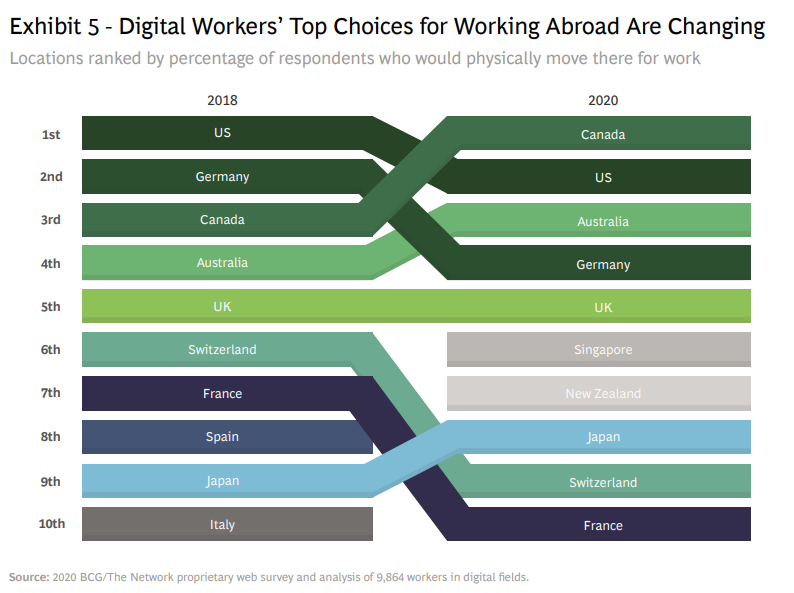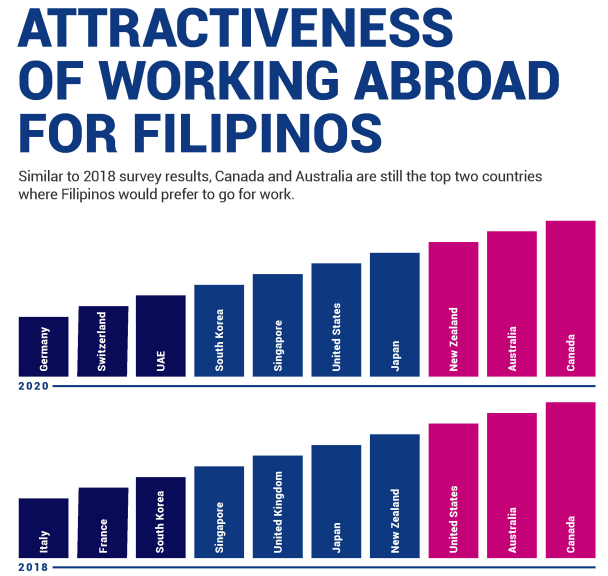10 Best Countries To Work Abroad, For Global And Filipino Workers
Working abroad is part of Philippine culture. Most of us grew up with family members or even parents overseas, and today’s working generation is carrying on the tradition. The Philippine Statistics Authority estimated 1.83 million Filipinos working overseas as of late 2021.
The idea of working abroad is exciting, but daunting at the same time. An international career requires plenty of careful planning. You need to narrow down your destinations and establish contacts with overseas employers or recruitment agencies, and sort out your personal relocation matters such as visa requirements, work permits and accommodation.
Interestingly though, the Decoding Global Talent (DGT) survey, a joint effort by Boston Consulting Group, The Network, and JobStreet, shows a continuing decline of interest in working abroad, both globally and among Filipinos. Since the first report, the percentage of global respondents willing to work in another country has dropped from 64% in 2014 to 50% in the recent survey. Filipinos have always shown higher interest compared to global workers, but our interest is cooling as well: from 86% (2014) to 75% (2018) to 54% now. These numbers may reflect pandemic fears, but also the continuing rise of remote work as a long-term option for Filipinos.
If you do still want to work abroad though, what countries are considered most popular?
The 10 best countries, according to the global workforce
GLOBAL | FILIPINOS | |
| 1 | Canada | Canada |
| 2 | USA | Australia |
| 3 | Australia | New Zealand |
| 4 | Germany | Japan |
| 5 | UK | USA |
| 6 | Japan | Singapore |
| 7 | Switzerland | South Korea |
| 8 | Singapore | UAE |
| 9 | France | Switzerland |
| 10 | New Zealand | Germany |
According to the survey, global digital workers consider Canada the #1 most attractive country to live and work in, with previous top spot US dropping to #2. Australia is a close 3rd (+1 slot from the previous survey, in 2018), while 4th is Germany (-2 from second place in 2018) and the UK remains at #5, unchanged from 2018.
Respondents ranked Japan at #6 (a four-slot jump from 2018), followed by Switzerland at #7 (+1 from 2018). Singapore makes its first ever appearance in the ranking at #8 (up 10 slots from 2018), while France came in at #9 (-1 from 2018). Closing out the top 10 was New Zealand, also new to the top 10.
Read more: Looking To Work Overseas? These In-Demand Jobs Abroad are Worth Considering
Why the change at the top? #1 Canada and #3 Australia are English-speaking countries, perceived by global respondents to be safer, with better social systems, labor protections, and public benefits such as health care, child care, and education. Compared to the US, they are seen to be more welcoming to immigrants, and to have managed the pandemic better.
An even bigger trend is the Asia-Pacific region's emergence as a go-to destination for relocation. Four Asia-Pacific countries -- Australia, Japan, Singapore, and New Zealand -- have risen in popularity since 2018. Global digital workers view many of these countries as more welcoming to immigrants and families, more socially or economically stable, and as better managers of early waves of the pandemic.
Read more: How To Work Abroad in 8 Steps
The 10 best countries, according to Filipinos
Decoding Global Talent is based on data from nearly 109,000 respondents in 180 countries. Of these, there were over 15,000 Filipino respondents, who also ranked the countries they’re open to relocating to. Who came out on top for us?
Consistent with the world, Canada was #1 for Filipinos – a rank it already held here in 2018. Australia came in at #2 (versus #3 globally), its same rank as 2018. Next in the rankings are New Zealand (#3), Japan (#4), the US (#5), Singapore (#6) and South Korea (#7), all moving up one slot from 2018. NZ, Japan and Singapore are all in the global top 10, but rank higher among Filipinos.
The difference between Filipino and global appeal is biggest for New Zealand, which is #3 for us but #10 globally, where it enters the top 10 for the first time. The wave of Filipinos migrating as families to New Zealand may account for this. South Korea’s ranking – #7 for Filipinos, but not in the global top 10 – could be due to the high business activity between our countries.
Closing out Filipino respondents’ top 10 were three new countries: the United Arab Emirates (#8), Switzerland (#9) and Germany (#10). The three countries displaced from top 10 were the UK (formerly #6), France and Italy (#9 and #10, respectively).
Based on these rankings, Filipinos continue to be drawn to neighboring countries for employment. It’s easy to see why. Proximity makes it easy to stay in touch with family, and the language barrier is lower because many of these countries use English for global business. In addition, these countries generally share the top three reasons that drive talents to work abroad: better career opportunities, acquiring work experience, and broadening personal experience.
Finding jobs abroad
If you plan to work in one of these countries, expect that you won’t be the only candidate fighting to secure a stable job there. The competition will be tough, and one should anticipate plenty of challenges in an unfamiliar environment.
Here are three practical tips to help you secure a job overseas:
1. Be flexible with your destination.
Target more than one destination. As the changing rankings show, even high-potential countries can become less attractive due to regulatory or political change. Go to a sought-after destination, and you’ll be just one of the many applicants in line. Instead, consider second-tier or fast-growing economies where you can easily stand out and make your mark.
2. Be ready to re-skill.
These days, the rapid pace of change in jobs and skills means that what you learnt in university may not be sufficient for your future career. In fact, to join the global work ecosystem, it may be essential for you to re-skill, maybe even ultimately switch careers. Facing the risk of being displaced by technology, 77% of FIlipino survey respondents were willing to re-skill, and many would use online courses or adopt a self-study method in order to do so.
3. Connect with recruiters in your industry.
You may be inclined to use the internet to find your job abroad, but it may be to your advantage to connect with recruitment agencies that assist job seekers on a global scale. Many international companies rely on these agencies to identify global top talents. Recruitment agencies can also help bridge the cultural gap and reduce the language barrier between you and your future employers, or sort out your paperwork before you begin work in a foreign land.
Read more: What is Online Recruitment and How Can it Benefit You?
#SEEKBetter Jobs abroad
If you’re looking for jobs abroad in Southeast Asia, Jobstreet can help. With over 230,000 corporate hirers across six countries (Hong Kong, Indonesia, Malaysia, Singapore, Thailand, and Vietnam) and the Philippines, we offer local support for you, regardless of the location. Sign up today and discover how we can help you nail your dream overseas job!
In the Philippines or overseas, it’s time to#SEEKBetter. Update your profile, explore careers and search the freshest job opportunities. Download the JobStreet app on the App Store and Google Play. Most of all, make time to explore the practical calculators and templates on Career Resources for useful real-world advice.


